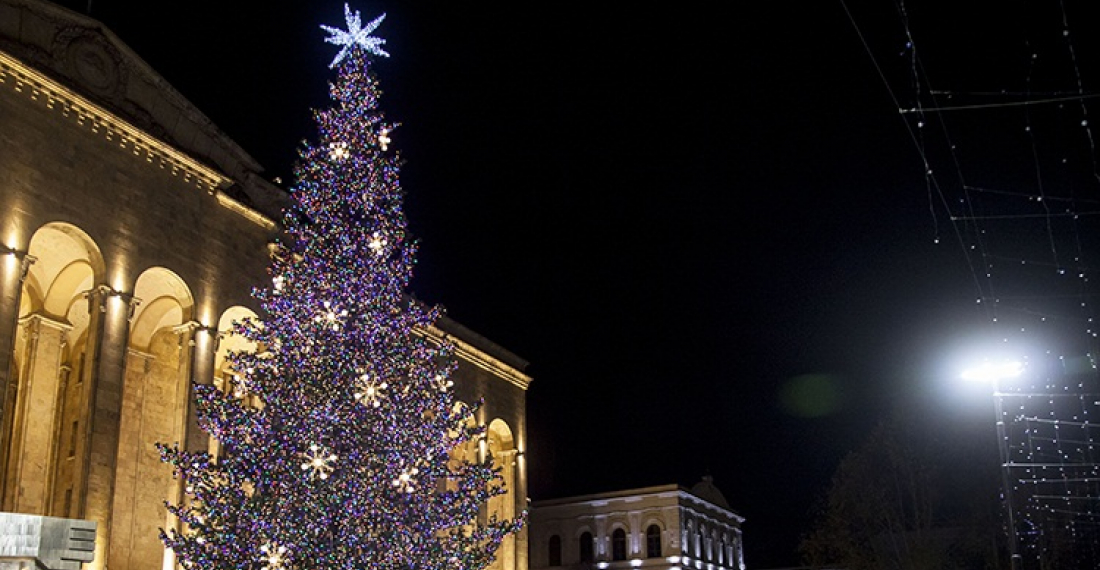In the South Caucasus, the leaders of Armenia, Azerbaijan and Georgia traditionally address their fellow citizens on new year's eve, summing up the year that is ending and welcoming the new year just before the stroke of midnight. It is an old Soviet tradition, that has lingered.
With the pandemic raging on, and most festivities cancelled, and with a war that has just ended, this year the messages could not have been more different.
Armenia is still under shock from its military defeat in its war with Azerbaijan in the autumn. Prime Minister Nikol Pashinya’s message was sombre in tone and content. “A year is coming to an end, the bitterness of which will accompany us for a long time. A war with severe consequences, a coronavirus pandemic, are the milestones of 2020 which will be remembered in the history of our people”.
Pashinyan recalled those who had died in the war, those who were injured, and those who remain in captivity. But Pashinyan also looked at the future. “We must build Armenia in a new way, we must build Artsakh in a new way, we must build our optimism in a new way, and I want to start 2021 with just such a mood”, the prime minister said.
Perhaps reflecting the need for divine intervention given his precarious position since signing the 10 November end of hostilities agreement with Azerbaijan, Pashinyan ended his new year speech quoting from the Sermon on the Mount, in the New Testament:
“Blessed are the mourners, for they shall be comforted; Blessed are they which do hunger and thirst after righteousness: for they shall be filled; Blessed are the pure in heart, for they shall see God; Blessed are the peacemakers, for they shall be called sons of God; Blessed are they which are persecuted for righteousness' sake: for theirs is the kingdom of heaven.”
The new year address of Azerbaijan’s president Ilham Aliyev could not have been more different. Ignoring completely the pandemic, president Aliyev focused on his country’s military victory against Armenia: “2020 will remain the year of our glorious Victory. Azerbaijan defeated Armenia in 44 days and liberated its native lands from occupation. This victory will live forever in the memory of the Azerbaijani people. This is a historic victory. We have restored historical justice.”
Without naming any country president Aliyev criticised the international community for its approach to the Karabakh issue, and said that he had often been put under great pressure to exclude a military option for resolving the Karabakh conflict, but he had always refused to do so. He accused Armenia of not genuinely engaging with the negotiations, and instead playing for time.
Aliyev ended his speech on a triumphalist note, saying: “Great things await us in the future, a new period begins for our country, a period of construction, a period of development, the days of restoration of our lands await us. This will be a glorious period. Although the enemy has destroyed everything in the occupied and already liberated lands, we will restore all our cities, our villages, and create a paradise in the Karabakh region. Our people deserve it. Victory belongs to our people and victory will always be with us!”.
In Georgia, the speech of prime minister Giorgi Gakharia was very different – shorter, and focusing primarily on the fight against the pandemic. Prime Minister Gakharia emphasised the need for unity:
“Unity will help us overcome every difficulty and will lead the Georgian people to fulfilling their long-standing dream of Georgia talking an honourable place in the European family of nations”, he said. Gakharia made no mention of the elections, and of the decision of opposition parties to boycott parliament.
source: commonspace.eu with agencies
photo: A Christmas tree in front of the Georgian Parliament in Tbilisi






